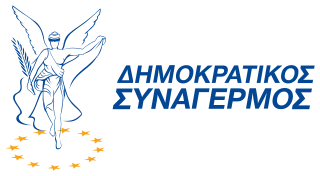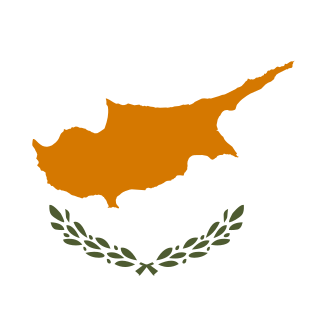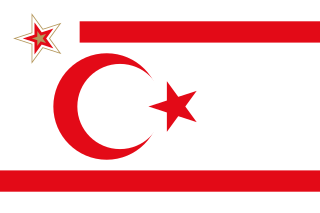| |||||
| Decades: | |||||
|---|---|---|---|---|---|
| See also: | Other events in 1969 · Timeline of Cypriot history | ||||
Events in the year 1969 in Cyprus .
| |||||
| Decades: | |||||
|---|---|---|---|---|---|
| See also: | Other events in 1969 · Timeline of Cypriot history | ||||
Events in the year 1969 in Cyprus .

Cyprus, officially the Republic of Cyprus, is an island country located in the eastern Mediterranean Sea. It is geographically in Western Asia, but its cultural ties and geopolitics are overwhelmingly Southeastern European. Cyprus is the third-largest and third-most populous island in the Mediterranean. It is located north of Egypt, east of Greece, south of Turkey, and west of Lebanon and Syria. Its capital and largest city is Nicosia. The northeast portion of the island is de facto governed by the self-declared Turkish Republic of Northern Cyprus, a claim not recognised by the international community.

The Republic of Cyprus is a unitary presidential representative republic, whereby the President of Cyprus is both head of state and head of government. Executive power is exercised by the government. Legislative power is vested in both the government and the parliament. The Judiciary is independent of the executive and the legislature.

The Cyprus problem, also known as the Cyprus dispute, Cyprus issue, Cyprus question or Cyprus conflict, is an ongoing dispute between the leadership of the Greek Cypriot community in the southern portion of Cyprus, and that of the Turkish Cypriot community, situated in the north.

Northern Cyprus, officially the Turkish Republic of Northern Cyprus, is a de facto state that comprises the northeastern portion of the island of Cyprus. Recognised only by Turkey, Northern Cyprus is considered by the international community to be part of the Republic of Cyprus.

Rauf Raif Denktaş was a Turkish Cypriot politician, barrister and jurist who served as the founding president of Northern Cyprus. He occupied this position as the president of the Turkish Republic of Northern Cyprus between the declaration of the de facto state by Denktaş in 1983 and 2005, as the president of the Turkish Federated State of Cyprus between 1975 and 1983 and as the president of the Autonomous Turkish Cypriot Administration between 1974 and 1975. He was also elected in 1973 as the vice-president of the Republic of Cyprus.

The Progressive Party of Working People is a Marxist–Leninist communist party in Cyprus.

Makarios III was a Greek Cypriot politician, archbishop and primate who served as the first president of Cyprus and in which is widely regarded as the Father of the Nation or "Ethnarch". He was also the leader of the autocephalous Church of Cyprus (1950–1977).

The Democratic Rally is a Christian-democratic and liberal-conservative political party in Cyprus led by Annita Demetriou. The party was founded on 4 July 1976 by veteran politician Glafcos Clerides. Clerides served as the president of Cyprus from 1993 until 2003. From 11 March 2023, the leader of the party is Annita Demetriou, who also serves as the president of the House of Representatives from June 2021.

The Cyprus Football Association is the governing body of football in Cyprus and is based in Nicosia. It organizes the football championships, whose top league is the Cypriot First Division. It also organizes the Cypriot Cup, the Cypriot Super Cup and the Cypriot national football team. Cyprus Football Association is also responsible for organizing all the futsal competitions, like the Cypriot Futsal league, the Cypriot Futsal Cup and the Cypriot Futsal Super Cup.

At the national level, the Republic of Cyprus holds elections for its head of state, the President of Cyprus, and for its legislature, the House of Representatives.

This article is about the history of Cyprus from 1878 to the present.

The president of Cyprus, officially the President of the Republic of Cyprus, is the head of state and the head of government of Cyprus, as well as the commander-in-chief of the Cypriot National Guard. The office was established by the Constitution of 1960, after Cyprus gained its independence from the United Kingdom.

The Turkish invasion of Cyprus began on 20 July 1974 and progressed in two phases over the following month. Taking place upon a background of intercommunal violence between Greek and Turkish Cypriots, and in response to a Greek junta-sponsored Cypriot coup d'état five days earlier, it led to the Turkish capture and occupation of the northern part of the island.

The Politics of Northern Cyprus takes place in a framework of a semi-presidential representative democratic republic, whereby the president is head of state and the prime minister is the head of government, and of a multi-party system. Executive power is exercised by the government. Legislative power is vested in both the government and the Assembly of the Republic. The judiciary is independent of the executive and the legislature.

The House of Representatives is the national unicameral legislature of the Republic of Cyprus. Members and three observers representing Armenian, Latin, and Maronite Cypriots are elected by proportional representation every five years. 30% of seats are allocated to Turkish Cypriots, but these have been vacant since 1964. The House of Representatives of Cyprus is the only legislature in Europe within a fully presidential system.

The president of Northern Cyprus is the head of state of the Turkish Republic of Northern Cyprus. Rauf Denktaş was the first and founding president of Northern Cyprus, and retired in 2005. His position was taken over by Mehmet Ali Talat, followed by Derviş Eroğlu, then Mustafa Akıncı, and the current president, Ersin Tatar.

Nicos Anastasiades is a Cypriot politician who served as the seventh president of Cyprus from 2013 to 2023. He was first elected in 2013, and then re-elected in 2018. Previously, he was the leader of Democratic Rally between 1997 and 2013 and served as Member of Parliament from Limassol between 1981 and 2013.

Northern Cyprus is recognised only by Turkey, a country which facilitates many of its contacts with the international community. After it was occupied by Turkey, Northern Cyprus' relations with the rest of the world were further complicated by a series of United Nations resolutions which declared its independence legally invalid. A 2004 UN Referendum on settling the Cyprus dispute was accepted by the Turkish Cypriots but rejected by the Greek Cypriots. After that, the European Union declared its intentions to assist in reducing the economic isolation of Northern Cyprus and began giving aid to the territory. However, due to pressure from Greece and the Republic of Cyprus, this aid coming from EU funds cannot be used on Greek Cypriot land and property nor on public bodies. As a result, these funds can be used only on 29 percent of people on the island of Cyprus.

The Constitution of Cyprus is a document, ratified on August 16, 1960, that serves as the Supreme Law of the Republic of Cyprus defining the system of government of the Cypriot Republic and the civil liberties for the Cypriot citizens. Cypriot government. It was drafted after the country won its independence in 1959 and is Cyprus's first and only constitution to date. The Constitution of the Republic of Cyprus has been in force for 62 years and it has been amended 18 (eighteen) times and 28 Articles of the 199 were modified since 1960. The 18th Amendment concerned Article 111.
Northern Cyprus and the United States do not have official diplomatic relations as the United States does not recognize Northern Cyprus as a sovereign nation and instead recognizes the region of Northern Cyprus as part of Cyprus. Despite no formal relations between the two nations, Northern Cyprus has appointed Ambassadors to the United States and has a representative office in Washington, D.C. which serves as its de facto embassy. Northern Cyprus also maintains a Representative office in New York City serving as a de facto consulate-general and as a de facto Permanent Mission to the United Nations. The United States on the other hand has a diplomatic office in North Nicosia as part of its embassy in Nicosia to Cyprus.